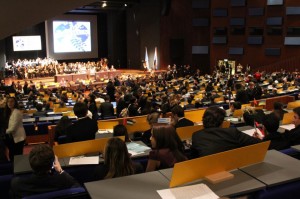1. Character
There’s an idea that the way you act when you are by yourself, and the way you act when no one is looking, is the true definition of who you are as a person. This is also the definition of character. My coach always made sure that we understood that just because you won the gavel, it doesn’t automatically make you a better person than everyone else. You could win one hundred gavels, but in the eyes of our coach, it didn’t matter unless you portrayed a great deal of character. By encouraging your teammates to improve themselves beyond the scope of public speaking and debate, you will foster a team unity that is strengthened by the good character of its members.
2. Caring
Going along with the concept of character is the notion of caring. Teammates must care about each other in order to succeed. My coach would always begin every training session or meeting by asking every single person in the room a simple yet sincere question: “How are you doing?” By ensuring that your teammates know that they have people talk to and turn to for support, you can make sure that your team is mentally strong enough to weather the challenges it will face at conferences and in life situations. In short, look out for one another.
3. Chemistry
While disagreement fosters discussion and innovation, too much dissent can lead to unrest and anger. On a Model UN team, chemistry is necessary not only so that everyone has fun, but also to make sure that every member feels safe and comfortable around their teammates. Promote team chemistry by planning social events outside of an academic setting, such as going out to dinner with your team or seeing a movie together. By planning events such as these, your team members will undoubtedly become friends, and the increased chemistry of your team will help you succeed on the circuit.
4. Commitment
There’s no way for a team to succeed if its members are not committed to its cause. Because Model UN is a lot of hard work and intensive effort, it might be difficult to get people to commit to your team. If you make sure to highlight the benefits of joining Model UN, however, you might be able to attract the right kind of hard-working kids to your team. Tell people about your leadership skills, or your public speaking abilities, or how you’ve learned to network. Tell people about the close sense of camaraderie that you feel with your teammates. By building a great team, you will be able to attract individuals who are just as committed to Model UN as you are.
5. Competence
One of my favorite sayings that my coach had still pops into my head from time to time when my motivation falls to dangerously low levels: “Work hard or go home.” Skill levels are obviously on a sliding scale across a Model UN team, from veteran delegates to new members who are still learning. But even if your skills might not be the best on your team, what is stopping you from working your hardest and doing your absolute possible best? In my coach’s eyes, competence wasn’t so much a measure of your skills; it was more a measure of your overall effort. As long as you worked hard and put in 110% of your effort, you were considered to be a benefit to your team.
All in all…
Team unity can be accomplished in many ways, and there are so many different kinds of teams that there is not a perfect method. But if you follow the philosophy of the Five Cs, your Model UN team will not only be successful on the circuit, but it will also be a great support system for your team members.




